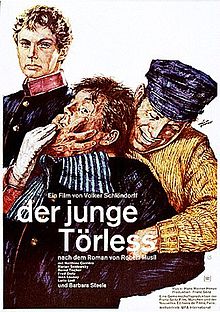- Young Törless
-
Young Törless 
Directed by Volker Schlöndorff Produced by Franz Seitz Written by Volker Schlöndorff
Herbert Asmodi
Robert Musil (novel)Starring Mathieu Carrière
Marian Seidowsky
Bernd Tischer
Fred DietzMusic by Hans Werner Henze Cinematography Franz Rath Editing by Claus von Boro Distributed by Cine-International Release date(s) 20 May 1966 Running time 87 minutes Country West Germany / France Language German Young Törless (German: Der junge Törless) is a 1966 German film directed by Volker Schlöndorff, adapted from the autobiographical novel The Confusions of Young Törless by Robert Musil. It deals with the sadistic and homoerotic tendencies of a group of boys at an Austrian military academy at the beginning of the 20th century.
Contents
Plot
The story is set at the beginning of the 20th century. When Thomas Törless (Mathieu Carrière) arrives at the academy, he learns how Anselm von Basini (Marian Seidowsky) has been caught stealing by fellow student Reiting (Fred Dietz), and is obliged to become Reiting's "slave," bowing to Reiting's sadistic rituals. Törless follows their relationship with intellectual interest but without emotional involvement.
Also partaking in these sessions is Beineberg (Bernd Tischer), with whom Törless visits Bozena (Barbara Steele), the local prostitute. Again, Törless is aloof and more intrigued than excited by the woman.
He is however very eager to understand imaginary numbers, which are mentioned in his maths lesson. The maths teacher is unwilling or unable to explain what these are, stating that in life, emotion is what rules everything - even mathematics.
After Basini is nearly lynched by a mob because of one of Reiting's intrigues, Törless realises intellectually that the other boys are simply cruel. He seems no more or less emotionally moved by this than by the revelation that he cannot understand imaginary numbers. He decides that he does not want to partake in cruelty, so decides to leave the academy. His teachers think that he is too "highly strung" for his own good, and do not want him to stay anyway - they are part of the system which can allow such terrible things to be done to the weak and vulnerable.
The attitudes of most of the people in the film echo the situation in Germany 40 years after Törless is supposed to have existed - in which Nazis showed no mercy,were obsessed with superiority, were supposedly dispassionate about human suffering but in fact succumbed to the basest emotionalism and destructiveness. Like so many people during the Nazi era, Törless is either conforms and goes along with evil deeds, or else pays lip service to the idea that it is bad, but has not the courage or feeling to take an active moral stance against it. He saves his own skin, coexisting with the evil regime by turning his back on it, rather than in trying to change anything. When the film was made, there was little public discussion in Germany of the Nazi era - it was all too close at that time. So Schlöndorff appears to have been taking the opportunity to air these significant issues in a half-disguised form.
At the end of the film Törless gets his mother to take him away from the school. As he drives away, laughing, we understand that there is no pity for the vulnerable, realise that nobody will ever stand up for them, and see most powerfully how the seeds of later German corruption are being sown.
Cast
- Mathieu Carrière - Thomas Törless
- Marian Seidowsky - Anselm von Basini
- Bernd Tischer - Beineberg
- Fred Dietz - Reiting
- Lotte Ledl - Gastwirtin / Innkeeper
- Jean Launay - Mathematiklehrer / Maths Teacher
- Barbara Steele - Bozena
Music
The film's significance as a cultural artifact of German post-WWII introspection is enhanced by the fact that its haunting medieval-sounding score is written by Hans Werner Henze, the noted German modernist composer. Henze, who came of age during the war, was prominent enough in this introspection by virtue of his left-political activism in the arts to feel driven to expatriation from Germany.
Awards
The film won the FIPRESCI Prize at the 1966 Cannes Film Festival.[1] It was also selected as the German entry for the Best Foreign Language Film at the 39th Academy Awards, but was not accepted as a nominee.[2]
See also
- List of submissions to the 39th Academy Awards for Best Foreign Language Film
- List of German submissions for the Academy Award for Best Foreign Language Film
References
- ^ "Festival de Cannes: Young Törless". festival-cannes.com. http://www.festival-cannes.com/en/archives/ficheFilm/id/2813/year/1966.html. Retrieved 2009-03-07.
- ^ Margaret Herrick Library, Academy of Motion Picture Arts and Sciences
External links
- Young Törless at the Internet Movie Database
- Young Törless at AllRovi
- Criterion Collection essay by Timothy Corrigan
Films directed by Volker Schlöndorff Fiction films Young Törless · A Degree of Murder · Man on Horseback · Baal · Sudden Wealth of the Poor People of Kombach · Morals of Ruth Halbfass · A Free Woman · Übernachtung in Tirol · The Lost Honour of Katharina Blum · Coup de Grâce · Germany in Autumn · The Tin Drum · The Circle of Deceit · War and Peace · Swann in Love · Death of a Salesman · A Gathering of Old Men · The Handmaid's Tale · Voyager · The Ogre · Palmetto · The Legend of Rita · The Ninth Day · Enigma - Eine uneingestandene Liebe · Strike · UlzhanDocumentaries Nur zum Spaß, nur zum Spiel · The Candidate · The Michael Nyman Songbook · Ein Produzent hat Seele oder er hat keine · Billy Wilder SpeaksCategories:- 1966 films
- German-language films
- Black-and-white films
- German films
- 1960s drama films
- Films directed by Volker Schlöndorff
- Films based on Austrian novels
- German LGBT-related films
Wikimedia Foundation. 2010.
